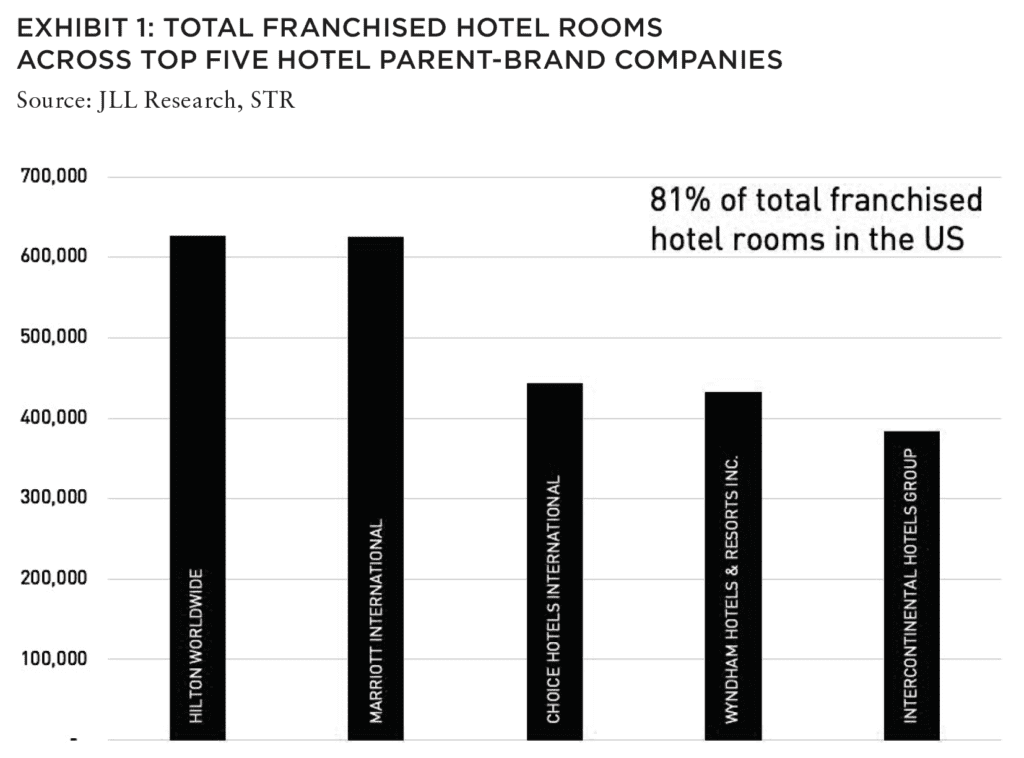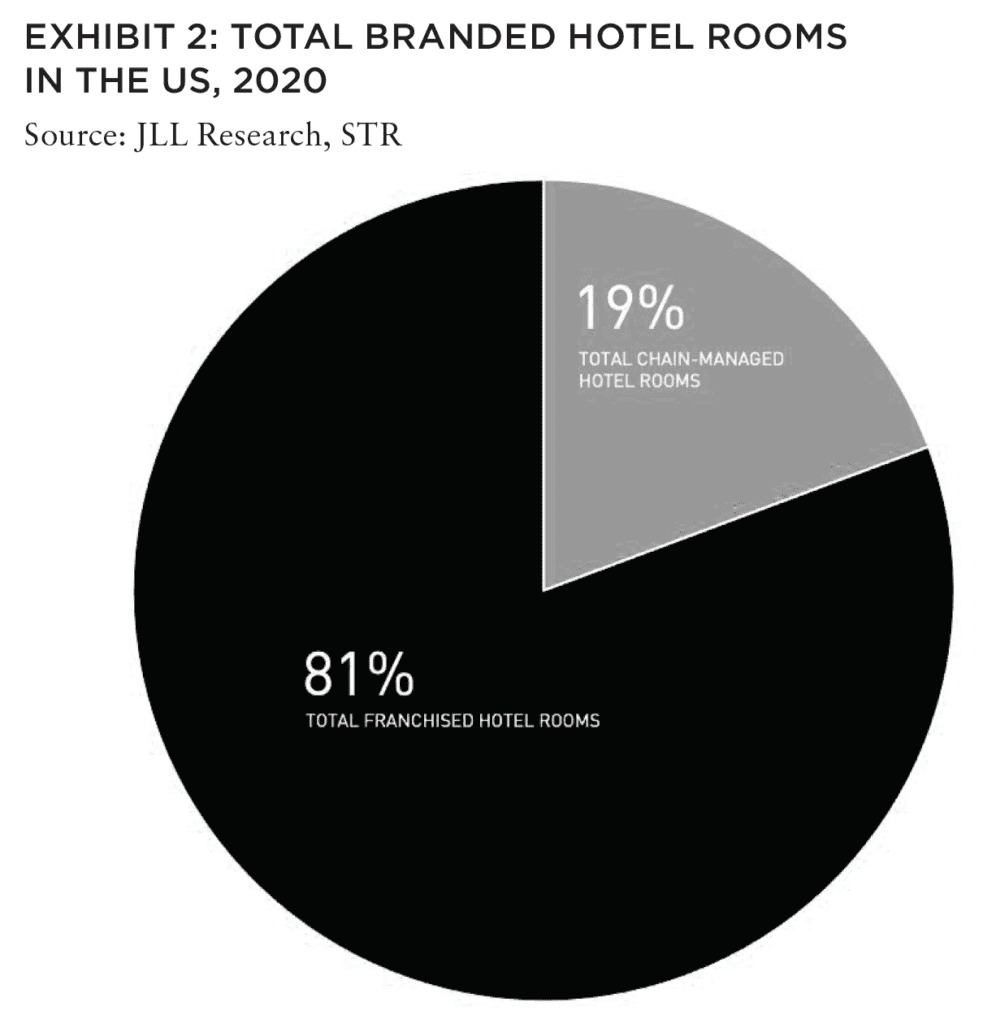The pandemic has heavily impacted the hospitality sector, but a growing wave of non-traditional investors has shown heightened interest in getting a piece of the evolving industry.
While certainly not approachable to every kind of entrepreneur, hotel franchising can be a great way to diversify a portfolio and bolster income.
With the lodging industry ready to move forward, third-party management and franchising agreements have come to the forefront of impacting global investor interest, with hotel owners demanding increased flexibility, deeper focus on operations, and more control of their assets.
FOCUS ON THE FRANCHISE
Even amidst the world-wide pandemic, hotel franchise networks grew, with the proportion of total franchised hotel rooms equal to 27% of total global hotel rooms, a slight increase over 2019 levels. The expansion of the franchise model is facilitated by the fact that Wall Street rewards parent hotel companies with a more asset-light strategy through higher stock values. Having little or no real estate debt on their books means that franchisors could easily grow across several markets and expand their reach without necessarily making significant capital outlays. This in turn resulted in brands becoming more ubiquitous and recognizable, such as Marriott, Hilton, and InterContinental.
Flagship brands are keener than ever to license out their name to an existing property, or to seek investment from outside companies to develop properties. In doing so, they receive a percentage of revenue from the franchisee and are able to avoid hefty up-front costs. They are also able to tap into their partners’ familiarity with local market dynamics, which is especially important when a brand is expanding its geographic footprint to new regions—a trend that has accelerated as global investor interest continues to rise.
Growing their franchise business also allows major hotel companies to grow their footprint at a faster pace and focus on brand standards and distributions.
Franchisees, in turn, help brands adapt to traveler’s changing preferences. These “collection brands” are, in essence, independent hotels that benefit from a major distribution system and service/product standards that guests are seeking. Amenities, such as contactless food delivery, mobile checkins and -outs, and building a local itinerary at the traveler’s fingertips, are now expected to be standardized and available as we continue navigating the pandemic and travelers become eager. These former “perks” are now necessities and should be key focal areas for every hotel operator.
In addition, a franchise owner might need to differentiate the product in view of competition from independent brands and vacation rentals. As consumers slowly begin traveling again, it is becoming clear that they favor larger, individual, and private accommodations to comfortably stay for longer periods of time and work more productively. Across the US during Q3 2020, extended-stay hotels (typically featuring larger rooms and kitchenettes) recorded an occupancy of 65.8%, down only 0.8% when compared to the same period in 2019, while the overall hotel industry logged an occupancy of 48%. Moreover, Airbnb posted a profit in Q3 following strong traveler demand for vacation homes in coastal and mountain areas.
Major hotel brands have started responding to the shift in guest preferences by moving forward with branded residential developments and partnerships with vacation rentals.
There are perks, too, for franchisees: They get to own a property with brand recognition; they have access to global reservation systems, loyalty, and leadership programs; and they receive critical technical support.
Franchisors also have a robust network of trained professionals that help the hotel operator hire and train the right people, in addition to a significant amount of resources that may be out of reach for an independent property owner. This institutional network of support was noteworthy during the pandemic—particularly in launching sanitation programs in partnership with major cleaning brands and boosting consumer confidence to stay in a hotel.
However, due to the volatile nature of the industry, hotel franchisors are becoming increasingly selective about who they take on as franchisees. The numerous responsibilities associated with running a 24-hour, 365-day operation make hotel franchising much more formidable than opening a new gym or café. As such, not everyone can get a franchise.
HOTEL MANAGEMENT AGREEMENTS, REIMAGINED

Big brands have taken a cautious approach to franchising, with their most important consideration being a manager’s experience in the industry. To be able to operate something that never shuts down and is consistently adhering to broad standards takes enormous effort and knowledge. In addition, as franchise agreements can last 10 to 15 years, it’s a long time to live up to expectations and pay fees for anyone unprepared.
If an investor decides that hotel franchising is the right move, there are still several considerations to make. Due diligence is crucial, as always, but just as important are the details of the franchise agreement.
Recently, hotel parent brand companies have responded to the changing needs of hotel owners and evolving markets to make management agreements more versatile and flexible. These changes, in part, were triggered by the rapid rise of third-party or white-label management companies over the last decade that operate hotels on behalf of owners.
Hotel parent brand companies are supporting the evolution of traditional management agreements via “Manchises,” or a brand management contract that can be converted to a franchise agreement.
Hotel investors have a choice when selecting a brand or manager for their hotels: either hire a hotel parent brand company to manage the hotel under a management agreement or hire a third-party management company under a franchise agreement.

Third-party management companies tend to offer shorter term contracts and can more easily be terminated if the owner feels that the asset is underperforming or would like to sell it unencumbered. By exiting the investment and selling the asset unencumbered, hotel owners have the potential of attracting a wider investor pool, which can result in enhanced pricing and returns.
Through traditional management agreements, which can last up to 60 years, hotel owners can avoid franchise fees and reap the benefits of being part of a larger platform that is skilled in hiring and training and can offer brand resources coupled with robust distribution channels. Hotel parent brand companies have focused on expanding their management agreements as a way to limit volatility in brand distribution and satisfy shareholders eager for fee annuities.
These objectives are often at odds with hotel owners, because they limit their control over the asset and result in costly management fees—sometimes up to 15% of monthly profit. These dynamics coupled with increasing competition from third party managers have motivated hotel parent brand companies to formulate more creative, versatile, and flexible agreements.
COVID-19 enhanced the competitiveness and challenges of operating a hotel. Moving forward, hotel parent brand companies and owners need to work together to find the most appropriate structure to meet investor objectives and brand goals. Manchise agreements may be the solution. Operating exposure for real estate investors becomes greater, though rewards have the potential to increase, as well.
ALSO IN SUMMIT (SPRING 2021)
GREAT LAKES / Tightening the Belts: How are shorthand labels like the “Sun Belt” and the “Rust Belt” shaping investment decisions? Should they?
AFIRE | Gunnar Branson and Benjamin van Loon
SOCIAL ISSUES / The Great Real Estate Reset: A data-driven initiative to remake how and what we build.
Brookings | Christopher Coes, Jennifer S. Vey, and Tracy Hadden Loh
SOCIAL ISSUES / Confronting the Myth: The events of the past year have driven businesses to confront racial inequity, but some still shy away from the challenges needed to make real progress.
Alfred Dewitt Ard Consulting | Shumeca Pickett
INDUSTRY OUTLOOK / CRE Prospects Post-COVID-19: How is commercial real estate set to perform in the post-COVID world?
Aegon Asset Management | Martha Peyton
HOSPITALITY / Time to Check In: If history is a guide, the time to invest in hotels is when things look bleak. This appears to be one of those times.
Barings Real Estate | Jim O’Shaughnessy
HOSPITALITY / Hoteling 2.0: The pandemic has impacted the hospitality, but a growing wave of non-traditional investors has shown heightened interest in the evolving industry.
JLL Hotels & Hospitality Group | Gilda Perez-Alvarado
RESIDENTIAL / Safe as Houses?: The future of residential investments is all about demographics—and the forces behind them.
American Realty Advisors | Sabrina Unger
RESIDENTIAL / Housing for Goldilocks : The pandemic highlights the advantages of single-family and appears to have accelerated migration to less dense, more affordable areas.
GTIS | Eliot Heher and Robert Sun
DATA CENTERS / Data Centers, Stage Center: Data center investments have proven resilient in periods of volatility—and they’re only going to become more essential and important into the future.
Principal Real Estate Investors | Bob Wobschall
CLIMATE CHANGE (WHITE PAPER) / Rather Than the Flood: A comprehensive look at climate-induced water disasters and their potential impact on CRE in the US.
New York Life Real Estate Investors | Stewart Rubin and Dakota Firenze
LOGISTICS / Reforging the Supply Chain: The only way to deliver on the service promises of a booming logistics sector requires a complete reimagination of the supply chain.
Stockbridge | David Egan
DEBT AND LEVERAGE / Leveraging Control: Though leverage is an important part of capital funding, it’s important to ask LPs if (and how) they should take control of their real estate leverage.
RCLCO Fund Advisors | William Maher and Ben Maslan
DEVELOPMENT / Recasting Risk and Return: The investment community can have an active role in economic recovery—but it will require recasting the traditional risk/return framework.
Standard REI | Shubrhra Jha
CORPORATE TRANSPARENCY ACT / Transparency Rules: Non-US-based investors face the disclosure regime of the Corporate Transparency Act. What do you need to know?
Pillsbury | Andrew Weiner
PENSIONS (WHITE PAPER) / Rising Pressures: The latest joint, in-depth report from Praedium and SitusAMC looks at rising fiscal pressures on state and local governments.
Praedium Group and SitusAMC Insights | Russell Appel, Peter Muoio, and Cory Loviglio | SitusAMC Insights
TALENT AND HR / Plugging the Skills Gap: Several trends are forcing change in the global commercial real estate industry, driving demand for new skills. How is the industry responding?
Sheffield Haworth | Max Shepherd
ESG / Operationalizing the Sustainability Agenda: During a time of unprecedented disruption, how should businesses approach the “new metrics” ESG of performance?
AccountAbility | Sunil A. Misser
FUTURE SHIFTS IN HOTEL OWNERSHIP
The high concentration of franchised hotels is a departure from the prevailing state of the industry in the 1980’s, when major hotel companies would take on significant debt in order to purchase or develop hotels. When they subsequently sold those assets, they would reach an agreement with the new owners to allow them to continue leveraging the brand name.
The economic recession in the 1990’s, however, brought a shift: Hotel companies were not able to sell properties in an illiquid market. Companies that transitioned into a more asset-light strategy found themselves in a stronger position.
The last decade has seen a continued shift in hotel ownership. In 2010, roughly 70% of branded hotels were franchised operations. By 2020, that figure rose to roughly 81%, led by the top five franchisors by total room count in the US: Marriott International, Hilton Worldwide, Wyndham Hotels & Resorts, Choice Hotels International, and Intercontinental Hotels Group. Collectively, these hotels represent 81% of total franchised branded rooms.
These companies continue to move away from owning the real estate portion of properties and towards a model where they grow in scale through franchise agreements. This allows them to benefit from a consistent revenue stream while in expansion mode, signaling future changes in the hospitality sector suitable to an investor with the appropriate appetite, experience, and foresight.
—
ABOUT THE AUTHOR
Gilda Perez-Alvarado is the Global CEO of JLL’s Hotels & Hospitality Group, the world’s leading hospitality advisor for more than 30 years.


